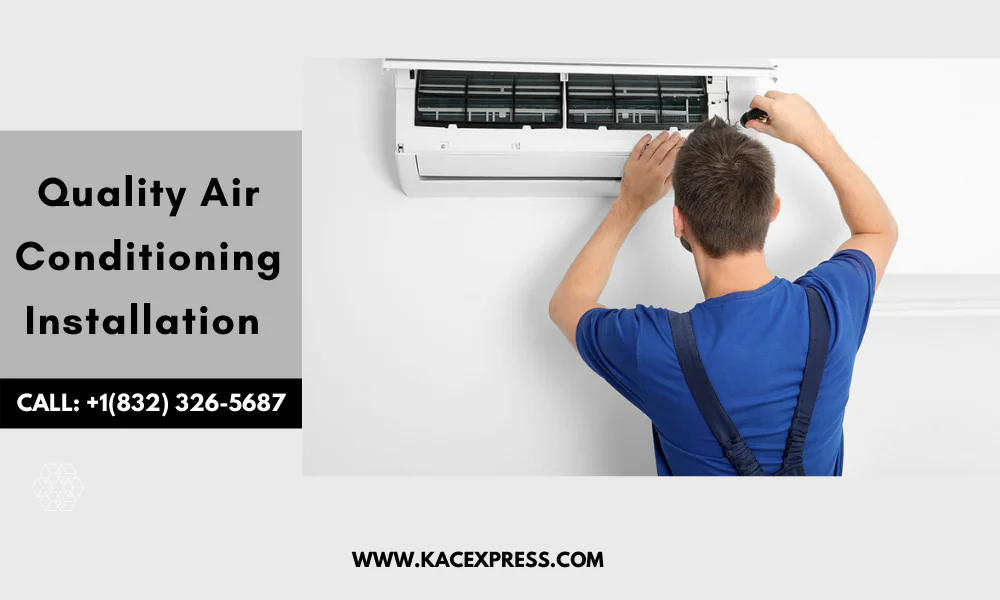If you are not a professional, installing an air conditioning unit for your home might be a challenging task. As a result, air conditioning installation should only be done by professionals. The work done on the day of the installation lays the groundwork for all future air conditioning usage. The system may not perform optimally if the installation is compromised in any manner.
Follow these helpful AC installation suggestions from a reliable air conditioning service provider to ensure your AC performs efficiently and properly for years to come.
1. Have the job done by a professional
The best way to ensure that your air conditioning installation goes successfully is to employ a professional. An air conditioning company’s proper AC installation includes knowing the necessary refrigerant levels, pressure, voltage, and secure mounts, among other things. It’s not a job you should attempt on your own, especially if you lack the necessary skills and tools to ensure that everything is done correctly. If you’re an HVAC technician, though, you can. Also, if you are an HVAC technician, keep in mind that Texas is an excellent place for HVAC technicians.
When an installation isn’t done correctly, professionals are frequently brought in to remedy the problems at a larger cost than the initial installation. You receive a seamless experience and a flawless system installation when you employ a professional.
If you don’t hire one, you risk paying for worthless warranties, future repairs, and possibly local code fines if you don’t.
2. Always keep the correct distance between indoor and outdoor unit
It is important to maintain the right distance between indoor and outdoor unit. The coolant travels at a low temperature through copper tubing between the indoor and outdoor split AC units. There will be some loss of cooling effect to the atmosphere when the refrigerant flows between the machines. To reduce this loss, keep the distance between the interior and exterior split AC units as low as feasible. The maximum distance between the inside and outside split AC units is approximately 15 meters.
Copper pipes of good quality are always suggested for AC installation.
3. Choose the Right Size
Bigger isn’t always better when it comes to household central air conditioning systems. Air conditioners that are too huge for the home can obstruct proper cooling. Professionals utilize heating, ventilation, and air conditioning (HVAC) load estimate to establish the proper size. It begins with the square footage of the home and takes into account other criteria such as the environment, insulation grade, number of windows and doors, and the number of residents.
The British Thermal Units (Btu) required to cool the home are determined by the same variables. When sizing a house air conditioner system, it’s frequently preferable to consult with an HVAC professional.
4. Set Clear Expectations to Lower Costs
The price of a central air conditioning system is determined by the home’s size and design. Efficiency, air filtration, zoning, smart systems, ducting, and insulation are all configurable possibilities.
Partially replacing a system can cost as little as $2,000. For a big home, the most efficient systems can cost up to $40,000. They include total duct replacement, zoning, indoor air quality enhancements, and filtration.
If you’re searching for a lesser price, be upfront about what you’re seeking and specify a date when you want the work done. A contractor will be more eager to work with you to discover the ideal solution for your demands if you demonstrate that you’re a serious buyer.
Few more!
5. Inspect the Existing Ductwork
Have your current ductwork evaluated before installing a central air conditioner. Some ducts may not be able to manage the increased airflow from a new air conditioning system, and changes may be required. It will be necessary to install ducting in residences that do not already have it. The expense of modifying or installing new ducting can run into hundreds of dollars.
Split-ductless systems are frequently a superior option for homes without ductwork.
6. Place It in the Right Place
Consider the amount of direct sunlight and water exposure, as well as any impediments in the area, before installing your air conditioning unit. The condenser should be placed on the north side of a house because it receives the least direct sunlight and thus stays cooler.
It is not a good idea to hide your air conditioner behind bushes or huge plants. It obstructs appropriate ventilation, as well as allows loose branches and leaves to accumulate and cause harm. “A central air conditioner should have two to three feet of clearance on each side since obstructions can hinder the system from cooling efficiently.
7. Set maintenance schedule
Your air conditioning system will run at its best if you maintain it regularly. Manufacturers also demand annual maintenance to keep their warranties valid. Preventative maintenance increases efficiency and saves money. Regular maintenance is also the most cost-effective strategy to avoid costly repairs.
If you want to assure that your HVAC system functions effectively and efficiently for many years to come, you should start a maintenance routine as soon as possible after it is installed. When you sign up for a maintenance program, make sure that it functions smoothly for a long time. It can also help you save money by lowering your bill and avoiding costly repairs.
While you can perform your HVAC inspections and maintenance, you risk overlooking important details that only a skilled AC specialist can detect. Plus, there are some things that only an HVAC expert is qualified to accomplish, such as adding refrigerant. You can, however, inspect the air conditioner’s components, remove dust and debris, and change the filters on your own.
Wrapping up!
Have yourThe above pointers will undoubtedly assist you in hiring the best air conditioning installation professional for your home. Finding an HVAC contractor is equally vital, as it affects your home’s comfort, air quality, and safety.


0 Comments